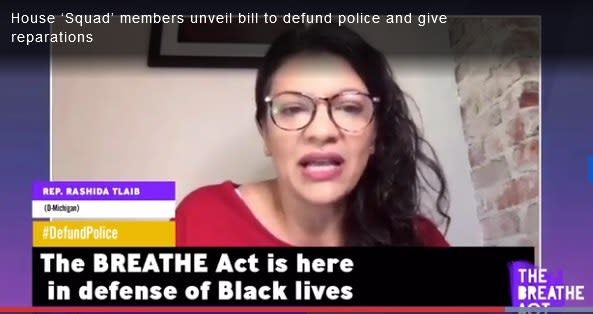Progressive members of the House of Representatives on Tuesday announced federal legislation to defund police and set up reparations for people who either are black or were harmed by law enforcement.
Reps. Rashida Tlaib (D-Mich.) and Ayanna Pressley (D-Mass.) are sponsors of the BREATHE Act, which was announced on a Zoom call. It has not yet been introduced. The two representatives are members of a progressive group of four legislators known as the "Squad." The two other Squad members, Reps. Alexandria Ocasio-Cortez of New York and Ilhan Omar of Minnesota, were not announced as bill backers.
The BREATHE Act is unlikely to pass the Democrat-held House, which approved a police reform bill in June in response to the killing of George Floyd by Minnesota police, the New York Post reports.
An overview of the BREATHE Act published online says it will slash federal funds to local police along with federal agencies, and spend the money on social welfare, health care, education and environmental programs.
According to the online description, the bill will “Eliminate federal programs and agencies used to finance and expand the U.S. criminal-legal system, such as the Department of Defense 1033 [surplus equipment] program, the Edward Byrne-Justice Assistance Grant Program, Community Oriented Policing Services, the Drug Enforcement Administration, and Immigration and Customs Enforcement.” It would preserve “non-punitive” elements of each.
It would offer a 50 percent federal match of local savings from shutting down jails and prisons, and would incentivize states to shut down “gang databases.”
The legislation has two reparations elements. It includes the Commission to Study Reparation Proposals for African-Americans Act by Rep. Sheila Jackson Lee (D-Texas), which has 135 Democratic co-sponsors. And it proposes a separate reparations program in honor of Michael Brown of Ferguson, Mo., who was killed while attacking a police officer.
The overview says the second reparations element would establish “commissions that design reparations for mass criminalization — including the War on Drugs, the criminalization of prostitution, and police violence; border violence; and the systemic violation of the U.S. Government’s treaty obligations to Tribal nations.”












